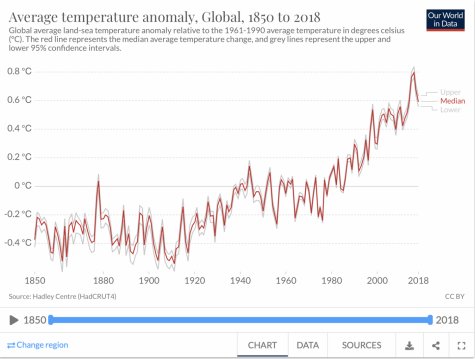Environmental stability
The pandemic had a profound impact on carbon emissions
June 8, 2020
While the coronavirus-induced stay-at-home order has sent the national and global economies racing toward a depression, it has also significantly reduced carbon emissions practically everywhere in the world. The inverse relationship between environmental sustainability and economic growth raises questions as to whether society will ever find a middle ground between the two. The governmental approach towards these issues moving forward from the coronavirus specifically could hold critical implications for future generations.
Global warming is caused by the greenhouse gas effect, which results from the accumulation of pollutants in the atmosphere. One of the main causes of an increase in pollution is an increase in the production of goods, which is directly related to economic growth.
History has shown that when the economy booms, carbon emissions increase significantly. Similarly, when the economy falls into depression, carbon emissions reduce significantly.

At this point, it may come as no surprise the periods of time with the lowest rates of carbon emissions, and comparatively low temperatures are the periods of time where the economy has struggled economically. Notably, one of these periods started around 1918, which marks the start of the 1918 Pandemic.
These same trends that have presented themselves true over the past 100 years are now present during the coronavirus pandemic. Just a few months into the crisis of the coronavirus, the economy has slowed significantly, leaving the U.S. level of unemployment equivalent to that of the Great Depression. As a result, however, carbon emissions on a global level have dropped significantly.
According to a study by CarbonBreif, in the first four weeks of the shutdown in China, carbon emissions dropped by upwards of 25%. The United States is expected to see a similar drop in carbon emissions in the next year. In fact, a recent report predicts that carbon emissions will fall approximately 2.6 billion tons globally this year, which is an 8% drop from 2019.
However, in a recent article from The New York Times, Glen Peters, the research director at the Center for International Climate and Environment Research in Norway explained that these decreases in carbon emissions aren’t significant or long-lasting enough to make a long-term change.
This has proven true in places like China, where the economy has started to open up again, and as a result, carbon emissions have rebounded. The same risk applies in the United States, as many states have started to open up again as well.
According to Junior Orla Malloy, a large advocate for environmental sustainability, finding a long-term solution for environmental issues will require a trade-off.
“Unlike economic growth, there’s no immediate benefit,” Orla said. “ Finding solutions for current environmental issues is about personal and large-scale sacrifice.”
As more nations start to reduce the restrictions on their economies, leaders are going to be faced with an important choice. On one hand, carbon emissions have the potential to grow rapidly if nations rely on dirty energy sources to rebuild their economies.
According to Orla Malloy this option overlooks any potential long-term implications.
“Many leaders across the globe are failing to consider how our economy is entirely dependent on the resources that nature provides,” Orla said. “When those resources run out, I have no idea what will happen to humanity.”
Many leaders across the globe are failing to consider how our economy is entirely dependent on the resources that nature provides.
— Orla Molloy
The other option, however, is to work toward rebuilding economies with environmental sustainability in mind. Many nations already demonstrated their support for this option through participating in the Petersberg Climate Dialogue XI last April. Leaders and important figures from France, Germany, Japan, and other nations around the world participated in this conference to encourage nations to invest in technology that would significantly reduce emissions as economies recover. To hear statements from the conference, you can watch these videos.
The Trump administration’s recent finalization of the rollback of fuel efficiency standards suggests, however, that moving forward from the coronavirus pandemic, the United States isn’t likely to prioritize a reduction in carbon dioxide emissions.
“I’ve lost hope for how our current government is dealing with COVID-19 and climate change,” Orla said. “Climate change is really overwhelming, and our administration plays on what the American people like to hear.”
The environmental impact of coronavirus spans in importance beyond the pandemic itself, in that the coronavirus merely highlights a trend between economic stability and environmental sustainability that has existed for years. As nations recover and rebuild across the world, now is a more pressing time than ever for nations to consider their priorities moving forward, as choices now have the potential to significantly influence the state of the future world.